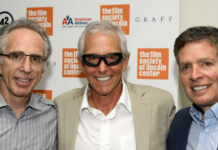
Stephen Silver
Rob Reiner, best known for his acting role in the 1970s sitcom “All in the Family” and for directing a series of beloved comedies — including “This is Spinal Tap,” “The Princess Bride” and “When Harry Met Sally” — is getting serious in his latest project.
“God and Country,” which just hit theaters, examines what Reiner sees as the troubling rise of Christian nationalism. The Jewish filmmaker produced the documentary, along with his wife Michele and his friend Steve Okin, with Dan Partland as director. The film follows the history, and the more recent activities, of Christian nationalism, from the 1950s Cold War to the fight over abortion rights to the rise of televangelist Jerry Falwell to the storming of the Capitol on Jan. 6.
“For decades, I was aware of … what we call now Christian nationalism,” Reiner said. “It’s a political movement, really, certainly not a spiritual or religious movement, and it started gaining more and more strength.”
He said he knew going into the project that he would have to navigate treacherous territory.
“It was a very delicate subject to take on, because the one thing we didn’t want to do was bash Christianity, and the film does not do that,” Reiner said. “It’s the exact opposite, actually.”
Reiner based the documentary on Katherine Stewart’s 2020 book “The Power Worshippers: Inside the Dangerous Rise of Religious Nationalism,” which defines the movement as a biblically derived effort to take control of all aspects of government and society. Okin gave him the book with the idea of making it into a movie.
“They believe that America should be a white Christian nation, and it is ordained by God to be a white Christian nation,” said Reiner, adding that its followers are “willing to go to the lengths of violence to get their way.”
Reiner organized and funded the project and helped to shape it. His name has been featured prominently in the marketing, including a recorded message before the film. He does not, however, appear on camera or in voiceover in the film itself.
“As a Jewish man, Rob Reiner has seen the rise of dangerous tides and is passionate it doesn’t happen again,” a promotional email about the film states. Reiner elaborated on that idea.
Thinking about an “autocracy, or a theocracy, where there is a ‘my way or the highway,’ and things have to be done in an autocratic way,” put him in mind of the Holocaust, he said. “My aunt was in Auschwitz, she survived. My wife’s mother survived Auschwitz, but her entire family was killed at Auschwitz, and I visited recently there. I’m very well aware of what can happen when an autocrat takes over a country.
“I’ve gotten a lot of criticism because I’m Jewish: ‘How dare you, a Jewish person, have anything to say about what Christians should or should not do,’” Reiner added. “But I always say, ‘I’m not in the film, look at the people we have in the film … It’s not Rob Reiner, the Jewish person, saying this.”
Indeed, the majority of the people interviewed in the film are prominent Christians who, for various reasons, are skeptics and opponents of Christian nationalism.
“We have some of the most thoughtful, devout Christian leaders, people who are in many cases very conservative Christian thinkers and pastors who talk about this movement… not just as a danger to democracy, but also a danger to Christianity itself, and a danger to the church,” Reiner said.
Stewart, who is also interviewed in the film, has said the 2022 Supreme Court decision overturning Roe v. Wade, which for 50 years guaranteed a woman’s right to an abortion, has emboldened Christian Nationalists to pursue an agenda that includes state funding of religious schools, prosecuting abortion providers and “accomplices,” and defending and even lionizing those who tried to prevent the transfer of power on Jan. 6.
“I am thrilled that my book helped inspire this documentary and I hope it helps draw attention to the dangerous political movement in our midst,” Stewart said. “The main thing I hope people can take away is that Christian nationalism is a political movement, not a religion, and it is profoundly hostile to democracy. With Trump’s attempted coup still in the news, the film should be especially helpful in letting people connect the dots.”
The conservative Christian embrace of Trump, who was not associated with Christian politics before his first presidential run, figures prominently in the film. Reiner said Trump has become “the first kind of national visible celebrity mouthpiece for their movement — and he was more than happy to take that on if he had support, and if that could help him politically.”
Among the critics of the movement shown in the documentary is Robert Schenck, a Christian reverend who now teaches at a Jewish seminary.
Schenck was raised by a Jewish father and a mother who converted to Judaism, but he went on to become a born-again Christian at age 16. He became an Assembly of God minister and anti-abortion activist. He later broke with the Christian nationalist movement and is now a visiting scholar of Christianity and Religious Leadership at Hebrew College in Newton, Massachusetts.
In the film, Schenck shares that during his career in the pulpit, he would use Trump’s name in sermons as “an example of everything a Christian should not be.”
Nevertheless, as Stewart has explained, Christian nationalists have embraced Trump, who has delivered on education policy, conservative Supreme Court picks and support for right-wing regimes abroad. In Christian nationalist circles, he is even referred to as the “anointed one.”
For many years, Reiner has been one of the entertainment industry’s most prominent critics of the former president, on social media and in cable news appearances.
Reiner inherited his comedy and filmmaking chops from his father, Carl Reiner, the late writer, director and actor, but it was the example of Norman Lear, who created “All in the Family” as well as the liberal advocacy group People for the American Way, that inspired Reiner’s political work.
“What I learned from Norman was that you could use your fame, your celebrity, whatever, to actually do some things in the political sphere,” he said. “Norman was a tremendous inspiration to me. I got from Norman that this is something you can do and you can be effective because you can use your voice to get ideas across.”






